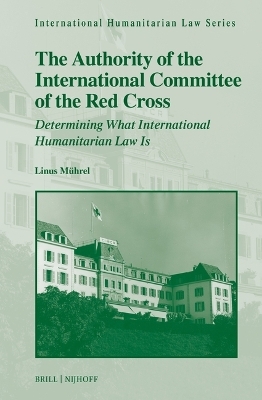
The Authority of the International Committee of the Red Cross
Martinus Nijhoff (Verlag)
978-90-04-68781-3 (ISBN)
This book conducts the first ever comprehensive study of the ICRC’s interpretations and law-ascertainments. It analyses in detail their impact on the development of international humanitarian law and international law in general as well as the reasons for their impact. This analysis involves the discussion of the ICRC’s authority. Is it legal or just factual authority? The analysis also illuminates the direction that IHL – and international law in general – develops. This insight sheds light on the question of the current type of international law, i.e., what international law is and who makes it.
Linus Mührel, Dr. iur. (2022), Freie Universität Berlin, is a criminal defense lawyer and lecturer at Technische Universität Dresden. He has published books and articles on public international law, especially international humanitarian law and human rights law.
Acknowledgements
Abbreviations
Table of Cases
Table of Treaties
Table of United Nations Documents
Introduction
1 The icrc’s Determinations on International Humanitarian Law: An Under-Researched Aspect in the Study of the icrc
2 What Can Be Learned from the icrc’s Interpretations and Law-Ascertainments about the Current Type of International Law?
2.1 Globalisation and the Role of Non-state Actors
2.2 Softening and Hierarchisation of International Law by Dominant States
2.3 Points of Departure
3 Methodology
4 Chapter Outline
1 The Authority of the International Committee of the Red Cross
1 The Concept of Authority
2 Does the icrc Possess a Competence to Interpret and Ascertain International Humanitarian Law?
2.1 The icrc’s Role under the Geneva Conventions and Additional Protocols
2.2 The icrc’s Role under the Statutes of the Red Cross and Red Crescent Movement
3 The icrc’s De Facto Authority
4 No Legal Bindingness
2 De Facto Authority of the icrc’s Interpretations and Law-Ascertainments
1 Pictet Commentaries
1.1 Broad Acceptance in the Jurisprudence of International Courts and Tribunals
1.2 Broad Acceptance in State Practice
1.3 The Marks of the Pictet Commentaries’ Authority
1.4 Conclusion: Shaping the Content of the Geneva Conventions
2 Commentary on the Additional Protocols
2.1 Broad Acceptance in the Jurisprudence of International Courts and Tribunals
2.2 Broad Acceptance in State Practice
2.3 The Marks of Authority of the Commentary on the Additional Protocols
2.4 Conclusion: Nearly Primary Sources, but Less Special than the Pictet Commentaries
3 Customary International Humanitarian Law Study
3.1 Critical but Welcoming Reactions in Academia
3.2 Selective Use in the Jurisprudence of International Courts and Tribunals
3.3 Rejection and Acceptance in State Practice
3.4 The Study’s Marks of Authority
3.5 Conclusion: Filling the Loopholes in International Humanitarian Law
4 Interpretive Guidance on the Notion of Direct Participation in Hostilities
4.1 Broad Criticism in Academia
4.2 Little Use in the Jurisprudence of International Courts and Tribunals
4.3 Cautious Reactions in State Practice
4.4 The Guidance’s Marks of Authority
4.5 Conclusion: Helpful but Not Authoritative
5 New Commentaries
5.1 Mostly Positive Reactions in Academia
5.2 Immediate Consideration in the Jurisprudence of International Courts and Tribunals
5.3 Rejection of the Interpretation of Common Article 1 in State Practice
5.4 The New Commentaries’ Marks of Authority
5.5 Conclusion: No Special Status for the New Commentaries Yet
6 Assessment: Changes in the Marks and Different Degrees of Authority
6.1 Proximity to Legal Sources
6.2 Increase and Diversification of the Expert Community
6.3 Expansion of International Law
7 Conclusion: The Change of the icrc’s Role for International Humanitarian Law
3 The icrc’s Impact on the Structural Rules of International Law
1 Identification of Customary International Law
1.1 Role in Academic Works
1.2 Role in the Work of the International Law Commission on the Identification of Customary International Law
1.3 High Impact on the Identification of Customary International Law
2 Interpretation of Treaties
2.1 Confirmation of the International Law Commission’s Draft Conclusions on Subsequent Practice?
2.2 Relevant Rules of International Law Applicable in the Relations between Parties
2.3 Preparatory Work
2.4 Possible Impact on the Interpretation of Treaties
3 Tendencies of Specialisation and Merging of the Sources of International Humanitarian Law
3.1 Implications for Specialisation of the Sources of International Humanitarian Law
3.2 Implications for Merging of the Sources of International Humanitarian Law
4 Conclusion: A New Role for the icrc
4 Legal Classification of the icrc’s Interpretations and Law-Ascertainments under the Sources of Law Doctrine and the Means of Interpretation
1 No Practice under Article 38 (1) (b) of the Statute of the International Court of Justice
2 Subsidiary Means for the Determination of Rules of Law under Article 38 (1) (d) of the Statute of the International Court of Justice
2.1 Teachings of the Most Qualified Publicists of the Various Nations
2.2 Does Determination of Rules of Law Include Their Interpretation?
3 No Means of Interpretation under Article 31 of the Vienna Convention on the Law of Treaties
4 Supplementary Means of Interpretation under Article 32 of the Vienna Convention on the Law of Treaties?
5 The icrc’s Interpretations and Law-Ascertainments under the Martens Clause as Dictates of Public Conscience?
6 What Role for Non-state Actors? A Political Question
Conclusion
1 Summary of Main Research Results
2 The Future Role of the icrc’s Interpretations and Law-Ascertainments
3 How the icrc’s Interpretations and Law-Ascertainments Should Be Dealt with in Academia and Legal Practice
References
Index
| Erscheinungsdatum | 28.02.2024 |
|---|---|
| Reihe/Serie | International Humanitarian Law Series ; 68 |
| Sprache | englisch |
| Maße | 155 x 235 mm |
| Gewicht | 778 g |
| Themenwelt | Recht / Steuern ► EU / Internationales Recht |
| Recht / Steuern ► Öffentliches Recht ► Völkerrecht | |
| ISBN-10 | 90-04-68781-5 / 9004687815 |
| ISBN-13 | 978-90-04-68781-3 / 9789004687813 |
| Zustand | Neuware |
| Haben Sie eine Frage zum Produkt? |
aus dem Bereich


